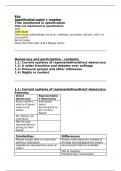Key
Specification point + number
Title mentioned in specification
Title not mentioned in specification
Text
Case study
Case study subheadings are aims, methods, successes, failures, why is it
successful?
No full stops
Dates first then title (1215 Magna Carta)
Democracy and participation - contents:
1.1: Current systems of representative/direct democracy
1.2: A wider franchise and debates over suffrage
1.3: Pressure groups and other influences
1.4: Rights in context
1.1: Current systems of representative/direct democracy
Features
Direct Representativ
democracy e democracy
Every citizen’s Individuals
vote is of equal select
value to all person/party to
others act on their
behalf
All citizens can
contribute
Not through
representatives
acting on their
behalf
Similarities Differences
People sought after to have their People make decisions instead of
opinions expressed through elected/appointed bodies
Legislature representing views of Government held accountable
voters
Will of majority
Parliamentary sovereignty
,Advantages and disadvantages
Direct democracy
Advantages Disadvantages
Purest form of democracy Risk of tyranny of majority
Great legitimacy People are easily swayed,
emotions
Fully proportional Some issues too complex for
citizens
Avoids delay/deadlock in system
Voice of the people
Difficult for future government to
change
Help educate citizens about politics
Representative democracy
Advantages Disadvantages
Representatives develop expertise May not act in interests of
constituents
Accountability near elections Accountability difficult between
elections
Time to deal with complex matters Public disengagement from social
issues
Public can choose to not be Ignoring needs of minorities
political
Only practical way with large
populations
Elected representatives less easily
swayed
The case for reform to improve democracy
Yes, democratic No, not democratic enough
Peaceful transition of power First-past-the-post (FPTP) electoral
- Pros: UK is remarkably conflict system for general elections
free - Produces disproportional results
- Cons: When results are unclear, - Discriminates against small
short-term conflict has arisen parties
(2010, 2017), claims of lack of
legitimacy
Free and fair elections House of Lords has considerable
- Pros: Most over 18s can vote, influence
little electoral fraud, strong legal - Is unelected
safeguards, proportional systems
in place (Scotland, Wales, Northern
Ireland)
- Cons: Some groups are denied
their right to vote (prisoners,
homeless), House of Lords is not
,elected, nor is the monarch, first
past the post system leads to
disproportionate results and many
wasted votes, governments are
often elected on modest proportion
of popular vote
Widespread participation in politics Parliamentary sovereignty
- Pros: Extensive membership of - Gives unlimited power to
pressure groups (free and active), government
growing level of participation in e-
democracy
- Cons: Since 2001, voter turnout
in general election has been lower,
party membership has been in
decline
Freedom of expression, Prime Minister’s powers
association, and information - Based on authority of unelected
- Pros: Press and broadcast media monarch
are free of government
interference, political neutrality
maintained, free access to
internet, no restrictions on legal
organisations, people may
organise and instigate public
protests
- Cons: Ownership of much press is
in hands of large companies,
owners tend to have political
biases, false news, government
has power to ban associations
based in terrorism or racial hatred,
public meetings can be restricted
on the grounds of public safety
Rule of law European Convention on Human
- Pros: Upheld strictly by the Rights not binding on Parliament
judiciary, right to judicial review - Threat on individual
underpins this, they are rights/liberties
independent and non-political
- Cons: Monarch is exempt from
legal restrictions, statistical
evidence to suggest those of
higher social/economic standing
are treated more leniently
Protection of rights and liberties
- Pros: Strong in the UK, country
signed up to ECHR and courts
enforce it, House of Lords protects
rights, as does the judiciary
- Cons: Parliament is a sovereign;
, rights are at the mercy of a
government with strong majority in
House of Commons
Constitution
- Pros: Parliament and courts
ensure the government acts within
the law, Human Rights Act acts as
a restraint on actions of the
government, constitutional checks
exist to limit governmental power
- Cons: No codified UK Constitution,
limits of government power are
vague, powers of Prime Minister
and extensive
Potential reform Pros Cons
Replace House of Remove unelected, Replacement may
Lords with elected unaccountable body cause greater rivalry
chamber from democratic with House of
process Commons (gridlock in
political process)
Replace FPTP electoral Remove negative Proportional systems
system with more features of FPTP (safe make coalitions more
proportional one seats, minority likely to form, risk
constituencies, unfair losing MP-constituency
representation, link
governments with
minority of support)
Codify UK Constitution Clarify processes of May prove too rigid,
political system, raise questions about
provide higher, location of
entrenched law sovereignty, more
power to unelected
judges
Create devolved Solve West Lothian England is too large to
English Parliament to question, create more work within a devolved
equalise devolution equal level of system, voters have
representation rejected regional
devolution
Introduce state party Allow politicians to Process of fundraising
funding focus on main job keeps
rather than politicians/parties
fundraising, remove connected to voters,
need to acquire money how would funding be
from powerful groups allocated?
Introduce compulsory Increase turnout in all Public engagement
voting elections, improve may not change, right
legitimacy of elected to vote includes right
officials to not vote




